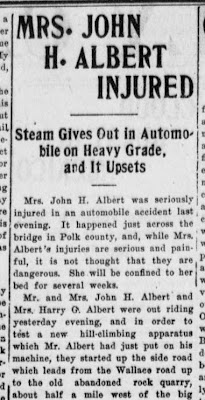You may not be curious about the origin of the phrase "hit by car," and the preference for passive voice when describing or reporting on crashes.
But if you are, here's a start. (This is really just a long footnote, be warned, and it is not yet very conclusive.)
Here in Salem the phrase clearly comes from larger urban areas, and it really is associated with streetcars before automobile cars.* There does not seem to be a meaningful usage here in the 1890s or earlier, and it's only in the early 1900s that it appears regularly.
Braking and steering on streetcars is different than in autos, and it may be that the constraints there were misapplied to autos because it was convenient for the industry to displace blame onto people walking.
There were also a high proportion of crashes involving streetcars, and some of the first traffic laws for automobiles regulated the passing of streetcars, especially when they were picking up or dropping off passengers.
About the same time, in what I believe is Salem's first automobile fatality,
Mary Holman died a few days after a crash described as an "accident" in 1905. It involved mechanical failure, and it's not clear how responsible was husband John's driving, maintenance, or other decisions.
The afternoon paper's obituary and note about the burial doesn't mention the cause of death, but the morning paper reiterates that it was "the result of injuries received in the automobile accident."
Holman was a significant Salemite from an important family, and her husband
John Albert was significant as a banker and leading citizen also. There are many reasons this first fatality is of interest. (See additional notes on daughter Myra Albert Wiggins
here and
here. She bicycled also and was part of the first generation of cyclists here.)
We will keep circling around and revisiting this because the origins of our autoist mentality, and the more specific question of the rhetoric we use to describe crashes, are of such great interest.
*
Probably there is research on this, but I don't know it. If you do, drop a citation in the comments please!









No comments:
Post a Comment